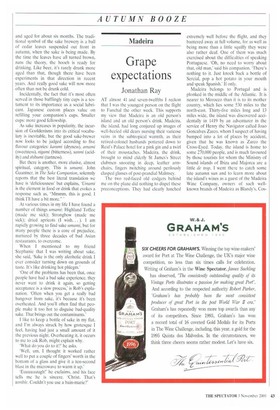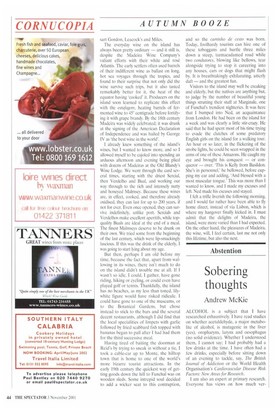Grape expectations
Jonathan Ray
AT almost 41 and seven-twelfths I reckon that I was the youngest person on the flight to Funchal the other week. This supports my view that Madeira is an old person's island and an old person's drink. Madeira, the island, had long conjured up images of well-heeled old dears nursing their varicose veins in the subtropical warmth, as their retired-colonel husbands pottered down to Reid's Palace hotel for a pink gin and a twirl of their moustaches. Madeira, the drink, brought to mind elderly St James's Street clubmen snoozing in deep, leather armchairs, fingers twitching around perilously clasped glasses of post-prandial Malmsey.
The two red-faced old codgers behind me on the plane did nothing to dispel these preconceptions. They had clearly lunched extremely well before the flight, and they bantered away at full volume, for as well as being more than a little squiffy they were also rather deaf. One of them was much exercised about the difficulties of speaking Portuguese. 'Oh, no need to worry about that, old man,' said his companion. 'There's nothing to it. Just knock back a bottle of Sercial, pop a hot potato in your mouth and speak Spanish.' If only.
Madeira belongs to Portugal and is plonked in the middle of the Atlantic. It is nearer to Morocco than it is to its mother country, which lies some 530 miles to the north-east. Thirty-five miles long and 13 miles wide, the island was discovered accidentally in 1419 by an adventurer in the service of Henry the Navigator called Joao Goncalves Zarco, whom I suspect of having bumped into a lot of places by accident, given that he was known as Zarco the Cross-Eyed. Today, the island is home to some 270,000 people, and is much favoured by those tourists for whom the Ministry of Sound islands of Ibiza and Majorca are a little de trop, I went there to catch some late autumn sun and to learn more about the island's wines as a guest of the Madeira Wine Company, owners of such wellknown brands of Madeira as Blandy's, Cos
sart Gordon, Leacock's and Miles.
The everyday wine on the island has always been pretty ordinary — and it still is, despite the Madeira Wine Company's valiant efforts with their white and rose Atlantis. The early settlers often used barrels of their indifferent wine as ballast on long, hot sea voyages through the tropics, and found to their surprise that not only did the wine survive such trips, but it also tasted remarkably better for it, the heat of the equator having 'cooked' it. Producers on the island soon learned to replicate this effect with the estufagem, heating barrels of fermented wine to 450 centigrade before fortifying it with grape brandy. By the 18th century Madeira was widely celebrated; it was drunk at the signing of the American Declaration of Independence and was hailed by George IV as 'the best wine in the world'.
I already knew something of the island's wines, but I wanted to know more, and so I allowed myself to be cajoled into spending an arduous afternoon and evening being plied with dozens of Madeiras at the Old Blandy's Wine Lodge. We went through the card several times, starting with the driest Sercial, then Verdelho and Bual, and working our way through to the rich and intensely nutty and honeyed Malmsey. Because these wines are, in effect, cooked, and therefore already oxidised, they can last for up to 200 years, if not for ever. Even once opened, they can survive indefinitely, unlike port. Sercials and Verdelhos make excellent aperitifs, while topquality Buals are ideal at the end of a meal. The finest Malmseys deserve to be drunk on their own. We tried some from the beginning of the last century, which were lip-smackingly luscious. If this was the drink of the elderly, I was going to start lying about my age.
But then, perhaps I am old before my time, because the fact that, apart from wallowing in its wines, there isn't much to do on the island didn't trouble me at all. If I wasn't so idle, I could, I gather, have gone riding, hiking or cycling, or could even have played golf or tennis. Thankfully, the island has no beaches, as my less than toned, lilywhite figure would have risked ridicule. I could have gone to one of the museums, or to the Botanical Gardens, but chose instead to stick to the bars and the several decent restaurants, although I did find that the local specialities of limpets with garlic followed by fried scabbard fish topped with bananas began to pall after I had had them for the third successive meal.
Having tired of baiting the doorman at Reid's by trying to sneak in without a tie, I took a cable-car up to Monte, the hilltop town that is home to one of the world's more bizarre tourist attractions. In the early 19th century the quickest way of getting goods down the hill to Funchal was on wooden sleds. Some intrepid soul decided to add a wicker seat to this contraption, and so the carrinho de cesto was born. Today, foolhardy tourists can hire one of these toboggans and hurtle three miles down a steep, tarrnacadamed road while two condutores, blowing like bellows, tear alongside trying to stop it careering into any houses, cars or dogs that might flash by. It is breathtakingly exhilarating, utterly daft — and the greatest fun.
Visitors to the island may well be creaking and elderly, but the natives are anything but, to judge by the number of beautiful young things strutting their stuff at Marginale, one of Funchal's trendiest nighteries. It was here that I bumped into Ned, an acquaintance from London. He had been on the island for a week and was clearly a little stir-crazy. He said that he had spent most of his time trying to evade the clutches of some predatory English girls on the island for a walking tour. An hour or so later, in the flickering of the strobe lights, he could be seen wrapped in the arms of one of these Amazons. He caught my eye and brought his conquest — or conqueror — over. 'This is Kelly from Basildon. She's in personnel,' he bellowed, before cupping my ear and adding, 'And blessed with a most muscular tongue.' This was more than I wanted to know, and I made my excuses and left. Ned made his excuses and stayed.
I felt a trifle liverish the following morning, and I would far rather have been able to fly home direct, instead of via Lisbon, which is where my hangover finally kicked in. I must admit that the delights of Madeira, the island, were more varied than I had expected. On the other hand, the pleasures of Madeira, the wine, will, I feel certain, last me not only this lifetime, but also the next.



















































































 Previous page
Previous page